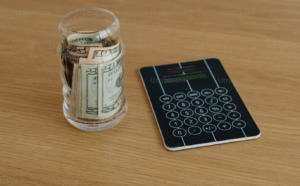This is my 15th yearly retirement budget first quarter test since I retired young at age of 51. When I mentioned retirement budget challenges with every new year’s first quarter to a yet to retire pal, they had no idea what I was talking about. With that in mind I thought I’d elaborate in case others might not have given much thought to this retirement financial aspect of life when on a fixed monthly income. The first quarter of every year brings a lot of high cost because they all come stacked within a short time-frame. It’s something that requires contemplation when looking at our retirement funding plan.
Successfully Passing The Yearly Retirement Budget First Quarter Test
When we look at our retirement planning it’s fun to figure out our yearly expenses and match it to our retirement lifestyle funding from our portfolio, any pensions, and at some point Social Security. We run our numbers against a good retirement calculator and figure that things look great.
Dividing a yearly budget by 12 and establishing monthly income means there’s always the need to stay on budget and set aside any extra money each month. Not all of our retirement lifestyle expenses are divided evenly over the entire year nor are they a fixed amount month to month or year after year. It can be a detail that may become lost in the celebratory fog of retirement leisure if we aren’t paying attention. We can easily overspend in low-cost months or underestimate future cost increases.
For many people, myself included, the first quarter of the year is heavy with high cost obligations.
It’s stuff that comes all at once. Passing this test requires setting aside enough cash each month throughout the year to meet it. Failure means dipping into the emergency fund, requesting an additional distribution from a retirement account, or having to use credit.
Don’t get me wrong, a failure of this yearly first quarter test is an emergency. That’s why having an emergency fund is important. But tapping it is the same as using credit. Either means additional budgetary hardship going forward to replenish the emergency fund or clear the debt. It adds to the challenge to save enough to pass the budget test in next year’s first quarter. Everyone’s situation is different. Here are some examples of my yearly retirement budget first quarter test challenges.
Holiday Spending Comes Due
We have a $1,500 Christmas holiday budget. But saying that means having that $1,500 set aside to cover it. Although we do use cash for some, there’s much that gets put on the reward credit card. That credit card billing cycle will ultimately put the balance due in January of the next year. We always have a higher than normal credit card bill to pay in January. Well after the holiday celebrations are over.
Medical Insurance Deductibles Reset
Like most people, we have some medications that we have to take. A new year means we are paying full-freight through at least the first quarter until our deductible is met. The same goes for any doctor visits. Just one of my daily medications costs over $700 for a 90 day supply. The first quarter for us means higher medication and any medical visit costs over what comes the rest of the year after deductibles have been met.
Property Taxes
If you still have a mortgage then a notice comes out regarding any property tax increases causing your monthly mortgage payment to increase. We’ve paid our home mortgage off so we get a property tax notice for the amount due. In normal years this is bad enough. But post pandemic property evaluations have not only increased our home value and net worth, but also with it comes a larger property tax owed. Most places allow a one time full amount or at best split into 2 close together payments. Because the exact amount is unknown until we get the notice, this is always a big yearly retirement budget first quarter test challenge. The test questions that we need to pass- Did we set aside enough and did we estimate close enough to what it might be.
Income Taxes
My goal is to always have just enough withheld to not owe much but to never have an income tax refund. That means I purposely go into the first quarter of every year knowing I will owe something. I try to keep it low but sometimes things happen to change the taxability of our income and it can be larger than budgeted for. For example, a year where you transition to Social Security while also lowering IRA distributions. I have to analyze and adjust my withholding every year to keep this from being a yearly retirement budget first quarter test failure.
Personal Property Insurance
We have autos and home property insurance. I have yearly homeowners insurance due in September to separate it from the first quarter property tax costs. To save money we have our auto insurance billed biannually in March and September instead of monthly.
Although I budget and save to cover my policy twice a year, this year’s auto insurance renewal popped 50% higher due to climate change auto losses (hail, fire, floods) across the country along with other factors like repair cost increases. It was definitely a first quarter challenge to meet this year. I now know that I have to increase the money I set aside to cover September’s increased auto premium. It also adds uncertainty as to what the homeowners policy increase will be.
Living On A Retirement Budget
I purposely retired early to a frugal lifestyle and pulled it off without a million dollar portfolio. It was always the plan and has been worth every bit of it. But some financial aspects are beyond our control. When we retire we can’t just coast on routine or past costs.
- We have to remain disciplined in our spending.
- Always set aside any extra money from our monthly fixed income.
- Be aware that there is always the chance of unexpected cost increases.
- Always plan for a stacked set of large annual or semi annual financial obligations as the first quarter brings.
It also illustrates the importance of having enough money overall in the portfolio to allow for retirement income flexibility. I don’t automatically raise our income distributions by the yearly inflation amount each year. We first try to make lifestyle, service, or budget adjustments. The time may come for a reevaluation of the portfolio and distribution amounts.
There’s also staying open to the option of accepting an opportunity, picking up a short-term job to meet financial surprises if things ever warranted an infusion of earned income.
How much did I need saved this year to pass the first quarter test?
Passing my yearly retirement first quarter test meant having a bit over $7,000 set aside to meet my obligations this year. $7,000 is a lot of money when looking at our overall frugal retirement lifestyle cost. When it comes to managing our retirement lifestyle budget, we must always stay frosty.
Thankfully this good economy has provided higher income from CD savings interests and portfolio returns.
Remaining debt free, maintaining year round spending discipline, and having a sound income distribution plan will always be a retirement financial superpower. It allows us to safely adjust our income to make major cost increases and stacked expenses easier to successfully manage passing the first quarter test.
Publisher: Source link












